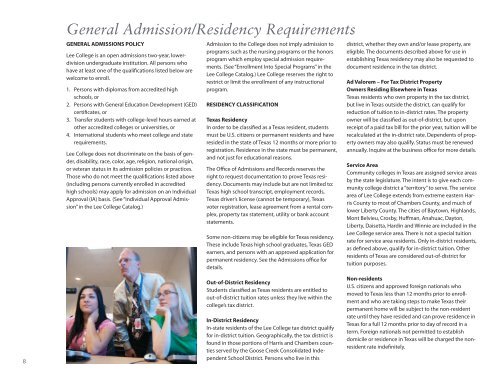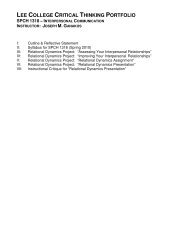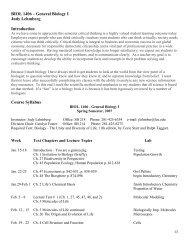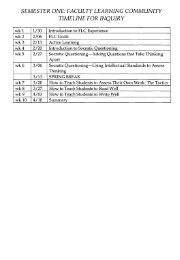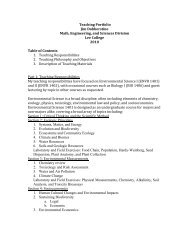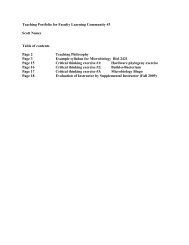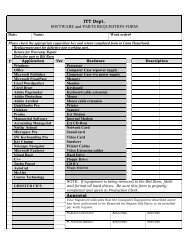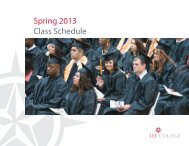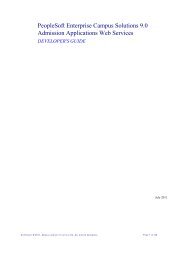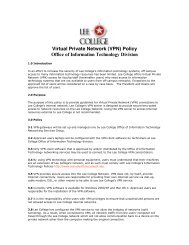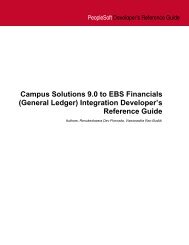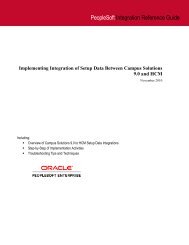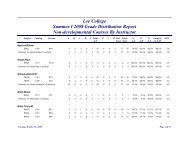Spring 2013 Class Schedule - Lee College
Spring 2013 Class Schedule - Lee College
Spring 2013 Class Schedule - Lee College
You also want an ePaper? Increase the reach of your titles
YUMPU automatically turns print PDFs into web optimized ePapers that Google loves.
General Admission/Residency Requirements<br />
GENERAL ADMISSIONS POLICY<br />
<strong>Lee</strong> <strong>College</strong> is an open admissions two-year, lowerdivision<br />
undergraduate institution. All persons who<br />
have at least one of the qualifications listed below are<br />
welcome to enroll.<br />
1. Persons with diplomas from accredited high<br />
schools, or<br />
2. Persons with General Education Development (GED)<br />
certificates, or<br />
3. Transfer students with college-level hours earned at<br />
other accredited colleges or universities, or<br />
4. International students who meet college and state<br />
requirements.<br />
<strong>Lee</strong> <strong>College</strong> does not discriminate on the basis of gender,<br />
disability, race, color, age, religion, national origin,<br />
or veteran status in its admission policies or practices.<br />
Those who do not meet the qualifications listed above<br />
(including persons currently enrolled in accredited<br />
high schools) may apply for admission on an Individual<br />
Approval (IA) basis. (See “Individual Approval Admission”<br />
in the <strong>Lee</strong> <strong>College</strong> Catalog.)<br />
Admission to the <strong>College</strong> does not imply admission to<br />
programs such as the nursing programs or the honors<br />
program which employ special admission requirements.<br />
(See “Enrollment Into Special Programs” in the<br />
<strong>Lee</strong> <strong>College</strong> Catalog.) <strong>Lee</strong> <strong>College</strong> reserves the right to<br />
restrict or limit the enrollment of any instructional<br />
program.<br />
RESIDENCY CLASSIFICATION<br />
Texas Residency<br />
In order to be classified as a Texas resident, students<br />
must be U.S. citizens or permanent residents and have<br />
resided in the state of Texas 12 months or more prior to<br />
registration. Residence in the state must be permanent,<br />
and not just for educational reasons.<br />
The Office of Admissions and Records reserves the<br />
right to request documentation to prove Texas residency.<br />
Documents may include but are not limited to:<br />
Texas high school transcript, employment records,<br />
Texas driver’s license (cannot be temporary), Texas<br />
voter registration, lease agreement from a rental complex,<br />
property tax statement, utility or bank account<br />
statements.<br />
Some non-citizens may be eligible for Texas residency.<br />
These include Texas high school graduates, Texas GED<br />
earners, and persons with an approved application for<br />
permanent residency. See the Admissions office for<br />
details.<br />
district, whether they own and/or lease property, are<br />
eligible. The documents described above for use in<br />
establishing Texas residency may also be requested to<br />
document residence in the tax district.<br />
Ad Valorem – For Tax District Property<br />
Owners Residing Elsewhere in Texas<br />
Texas residents who own property in the tax district,<br />
but live in Texas outside the district, can qualify for<br />
reduction of tuition to in-district rates. The property<br />
owner will be classified as out-of-district, but upon<br />
receipt of a paid tax bill for the prior year, tuition will be<br />
recalculated at the in-district rate. Dependents of property<br />
owners may also qualify. Status must be renewed<br />
annually. Inquire at the business office for more details.<br />
Service Area<br />
Community colleges in Texas are assigned service areas<br />
by the state legislature. The intent is to give each community<br />
college district a “territory” to serve. The service<br />
area of <strong>Lee</strong> <strong>College</strong> extends from extreme eastern Harris<br />
County to most of Chambers County, and much of<br />
lower Liberty County. The cities of Baytown, Highlands,<br />
Mont Belvieu, Crosby, Huffman, Anahuac, Dayton,<br />
Liberty, Daisetta, Hardin and Winnie are included in the<br />
<strong>Lee</strong> <strong>College</strong> service area. There is not a special tuition<br />
rate for service area residents. Only in-district residents,<br />
as defined above, qualify for in-district tuition. Other<br />
residents of Texas are considered out-of-district for<br />
tuition purposes.<br />
8<br />
Out-of-District Residency<br />
Students classified as Texas residents are entitled to<br />
out-of-district tuition rates unless they live within the<br />
college’s tax district.<br />
In-District Residency<br />
In-state residents of the <strong>Lee</strong> <strong>College</strong> tax district qualify<br />
for in-district tuition. Geographically, the tax district is<br />
found in those portions of Harris and Chambers counties<br />
served by the Goose Creek Consolidated Independent<br />
School District. Persons who live in this<br />
Non-residents<br />
U.S. citizens and approved foreign nationals who<br />
moved to Texas less than 12 months prior to enrollment<br />
and who are taking steps to make Texas their<br />
permanent home will be subject to the non-resident<br />
rate until they have resided and can prove residence in<br />
Texas for a full 12 months prior to day of record in a<br />
term. Foreign nationals not permitted to establish<br />
domicile or residence in Texas will be charged the nonresident<br />
rate indefinitely.


